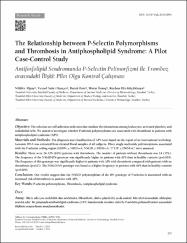The relationship between P-Selectin polymorphisms and thrombosis in antiphospholipid syndrome: A pilot case-control study
Citation
Alpay N, Hancer VS, Erer B, Inanc M, Diz-Kucukkaya R. The relationship between P-Selectin polymorphisms and thrombosis in antiphospholipid syndrome: A pilot case-control study. Turk J Haematol. 2014; 31(4): 357-62. doi: 10.4274/tjh.2013.0091.Abstract
Objective: The selectins are cell adhesion molecules that mediate the interactions among leukocytes, activated platelets, and endothelial cells. We aimed to investigate whether P-selectin polymorphisms are associated with thrombosis in patients with antiphospholipid syndrome (APS).
Methods: The diagnosis and classification of APS were based on the report of an international workshop. Genomic DNA was extracted from citrated blood samples of all subjects. Three single nucleotide polymorphisms associated with the P-selectin coding region (S290N, c.1087G>A; N562D, c.1902G>A; T715P, c.2363A>C) were assessed. Amaç: Hücre adezyon molekülü olan selektinler, lökositlerle, aktive plateletler ya da endotel hücreleri arasındaki etkileşime aracılık eder. Bu çalışmada antifosfolipid sendromu (AFS) hastalarında tromboz riski ile P-selektin polimorfizmleri arasındaki ilişkinin araştırılması amaçlanmaktadır.
Yöntemler: AFS tanısı “International Workshop” tanı ve sınıflandırma kriterleri ile konulmuştur. Hastaların periferik kan örneklerinden DNA elde edilmiştir. P-selektin gen bölgesiyle ilişkili üç tane tek nükleotid polimorfizmi (S290N, c.1087G>A; N562D, c.1902G>A; T715P, c.2363A>C) araştırılarak genotipleri belirlenmiştir.


















